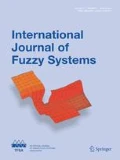Abstract
This paper deals with the problem of stability analysis for discrete-time Takagi–Sugeno (T–S) fuzzy systems. The double homogeneous polynomially parameter-dependent (DHPPD) Lyapunov function is proposed, which is expressed in the double homogeneous polynomial form not only of the membership functions but also of the state variables. Based on the DHPPD Lyapunov function, a relaxed stability condition is derived. Additionally, the complete square matricial representation of homogeneous polynomials is considered to further reduce the conservatism. Finally, two numerical examples are provided to illustrate the effectiveness of the proposed approach.
References
Takagi, T., Sugeno, M.: Fuzzy identification of systems and its applications to modeling and control. IEEE Trans. Syst. Man Cybern. SMC–15(1), 116–132 (1985)
Tanaka, K., Wang, H.O.: Fuzzy Control Systems Design and Analysis: A Linear Matrix Inequality Approach. Wiley, New York (2001)
Tanaka, K., Hori, T., Wang, H.O.: A multiple Lyapunov function approach to stability of fuzzy control systems. IEEE Trans. Fuzzy Syst. 11(4), 582–589 (2003)
Lee, D.H., Park, J.B., Joo, Y.H.: A fuzzy Lyapunov function approach to estimating the domain of attraction for continuous-time Takagi–Sugeno fuzzy systems. Inf. Sci. 185(1), 230–248 (2012)
Sala, A., Arino, C.: Asymptotically necessary and sufficient conditions for stability and performance in fuzzy control: applications of Polya’s theorem. Fuzzy Sets Syst. 158(24), 2671–2686 (2007)
Peng, C., Yue, D., Fei, M.R.: Relaxed stability and stabilization conditions of networked fuzzy control systems subject to asynchronous grades of membership. IEEE Trans. Fuzzy Syst. 22(5), 1101–1112 (2014)
Chen, J., Xu, S., Li, Y., Qi, Z., Chu, Y.: Improvement on stability conditions for continuous-time T–S fuzzy systems. J. Frankl. Inst. 353(10), 2218–2236 (2016)
Chen, J., Xu, S., Li, Y., Chu, Y., Zou, Y.: Further studies on stability and stabilization conditions for discrete-time T–S systems with the order relation information of membership functions. J. Frankl. Inst. 352(12), 5796–5809 (2015)
Chen, J., Xu, S., Jia, X., Zhang, B.: Novel summation inequalities and their applications to stability analysis for systems with time-varying delay. IEEE Trans. Autom. Control. 62(5), 2470–2475 (2017)
Su, X., Wu, L., Shi, P., Song, Y.: A novel approach to output feedback control of fuzzy stochastic systems. Automatica 50(12), 3268–3275 (2014)
Su, X., Shi, P., Wu, L., Song, Y.: A novel control design on discrete-time Takagi–Sugeno fuzzy systems with time-varying delays. IEEE Trans. Fuzzy Syst. 21(4), 655–671 (2013)
Wu, L., Su, X., Shi, P., Qiu, J.: A new approach to stability analysis and stabilization of discrete-time TS fuzzy time-varying delay systems. IEEE Trans. Syst. Man Cybern. B Cybern. 41(1), 273–286 (2011)
Guerra, T.M., Miguel, M.: Strategies to exploit non-quadratic local stability analysis. Int. J. Fuzzy Syst. 14(3), 372–379 (2012)
Guelton, K., Manamanni, N., Duong, C.C., Koumba-Emianiwe, D.L.: Sum-of-squares stability analysis of Takagi–Sugeno systems based on multiple polynomial Lyapunov functions. Int. J. Fuzzy Syst. 15(1), 1–8 (2013)
Li, H., Sun, X., Wu, L., Lam, H.: State and output feedback control of a class of fuzzy systems with mismatched membership functions. IEEE Trans. Syst. 23(6), 1943–1957 (2015)
Li, H., Sun, X., Shi, P., Lam, H.: Control design of interval type-2 fuzzy systems with actuator fault: sampled-data control approach. Inf. Sci. 302, 1–13 (2015)
Lendek, Z., Guerra, T.M., Lauber, J.: Controller design for TS models using delayed nonquadratic Lyapunov functions. IEEE Trans. Cybern. 45(3), 453–464 (2015)
Guerra, T.M., Vermeiren, L.: LMI-based relaxed nonquadratic stabilization conditions for nonlinear systems in the Takagi–Sugeno’s form. Automatica 40(5), 823–829 (2004)
Guerra, T.M., Bernal, M., Guelton, K., Labiod, S.: Non-quadratic local stabilization for continuous-time Takagi–Sugeno models. Fuzzy Sets Syst. 201, 40–54 (2012)
Feng, G.: Stability analysis of discrete-time fuzzy dynamic systems based on piecewise Lyapunov functions. IEEE Trans. Fuzzy Syst. 12(1), 22–28 (2004)
Ding, B.: Homogeneous polynomially nonquadratic stabilization of discrete-time Takagi–Sugeno systems via nonparallel distributed compensation law. IEEE Trans. Fuzzy Syst. 18(5), 994–1000 (2010)
Lee, D.H., Park, J.B., Joo, Y.H.: Improvement on nonquadratic stabilization of discrete-time Takagi–Sugeno fuzzy systems: multiple-parameterization approach. IEEE Trans. Fuzzy Syst. 18(2), 425–429 (2010)
Xie, X., Ma, H., Zhao, Y., Ding, D.W., Wang, Y.: Control synthesis of discrete-time T–S fuzzy systems based on a novel non-PDC control scheme. IEEE Trans. Fuzzy Syst. 21(1), 147–157 (2013)
Xie, X., Yue, D., Zhu, X.: Further studies on control synthesis of discrete-time T–S fuzzy systems via useful matrix equalities. IEEE Trans. Fuzzy Syst. 22(4), 1026–1031 (2014)
Shen, H., Su, L., Park, J.H.: Reliable mixed \(H_{\infty }\)/passive control for T–S fuzzy delayed systems based on a semi-Markov jump model approach. Fuzzy Sets Syst. 314, 79–98 (2017)
Shen, H., Park, J.H., Wu, Z.G.: Finite-time reliable \(\cal{L}_2-\cal{L}_{\infty }/\cal{H}_{\infty }\) control for Takagi–Sugeno fuzzy systems with actuator faults. IET Control Theory Appl. 8(9), 688–696 (2014)
Chen, J., Xu, S., Zhang, B., Qi, Z., Li, Z.: Novel stability conditions for discrete-time T–S fuzzy systems: a Kronecker-product approach. Inf. Sci. 337–338, 72–81 (2016)
Chen, J., Xu, S., Zhang, B., Chu, Y., Zou, Y.: New relaxed stability and stabilization conditions for continuous-time T–S fuzzy models. Inf. Sci. 329, 447–460 (2016)
Chesi, G., Garulli, A., Tesi, A., Vicino, A.: Homogeneous Lyapunov functions for systems with structured uncertainties. Automatica 39(6), 1027–1035 (2003)
Chesi, G.: Establishing robust stability of discrete-time systems with time-varying uncertainty: the Gram-SOS approach. Automatica 50(11), 2813–2821 (2014)
Oliveira, R.C.L.F., Peres, P.L.D.: Parameter-dependent LMIs in robust analysis: characterization of homogeneous polynomially parameter-dependent solutions via LMI relaxations. IEEE Trans. Autom. Control. 52(7), 1334–1340 (2007)
Hardy, G.H., Littlewood, J.E., Polya, G.: Inequalities, 2nd edn. Cambridge University Press, Cambridge (1952)
Acknowledgements
This work was supported in part by the National Nature Science Foundation under Grants 61673215, 61403199, 61403178, the Natural Science Foundation of Shandong Province for Outstanding Young Talents in Provincial Universities under Grant ZR2016JL025.
Author information
Authors and Affiliations
Corresponding author
Rights and permissions
About this article
Cite this article
Chen, J., Xu, S., Ma, Q. et al. Relaxed Stability Conditions for Discrete-Time T–S Fuzzy Systems via Double Homogeneous Polynomial Approach. Int. J. Fuzzy Syst. 20, 741–749 (2018). https://doi.org/10.1007/s40815-017-0339-5
Received:
Revised:
Accepted:
Published:
Issue Date:
DOI: https://doi.org/10.1007/s40815-017-0339-5

